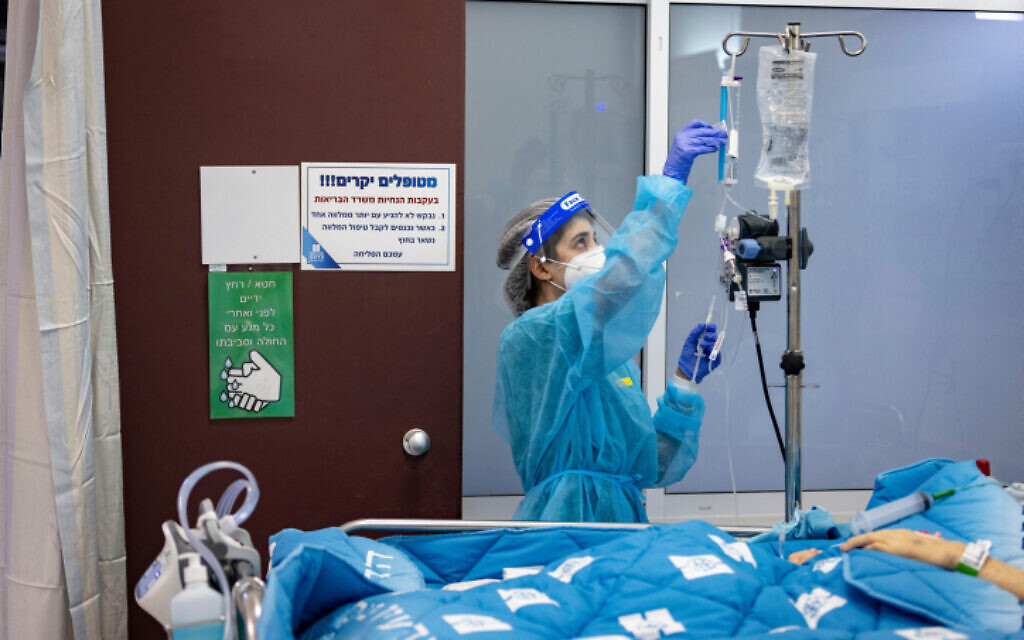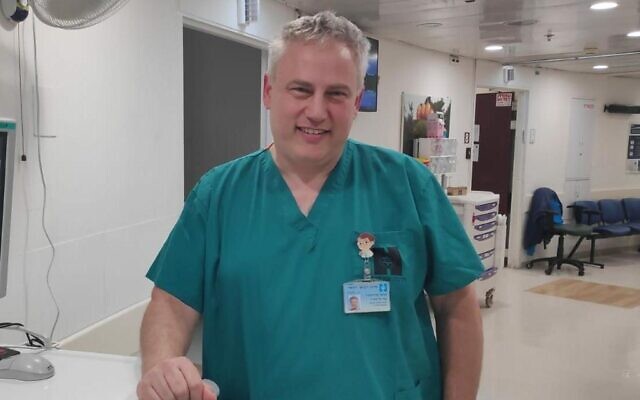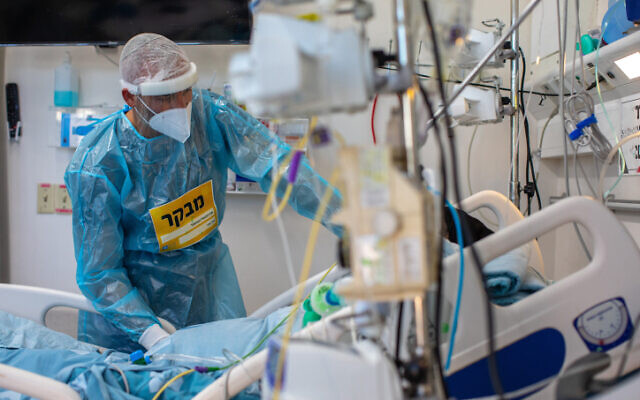At Jerusalem’s Hadassah Hospital there is a race to open enough beds as cases grow, but relief that Omicron isn’t leaving parents gasping for air as its predecessors did

For three coronavirus waves, patients gasped for air as Prof. Zvi Fridlender of Hadassah Medical Center darted between them, trying to help. This time around, to his relief, they are breathing easier.
“With Delta, I would walk around and see this patient is deteriorating with breathing, this one needs oxygen, and this one will soon need ventilating,” the senior physician said on Monday, as he prepared to open and head his hospital’s third coronavirus ward, which is expected to receive its first patients on Tuesday.
“With Omicron, we don’t have the same extent of deterioration happening before our eyes; the impact is less dramatic.” This is the case even among serious patients, Fridlender noted.
This assessment from Hadassah’s wards and others appears to corroborate a growing body of research suggesting that Omicron doesn’t infect cells deep in the lung as much as it hits those in the upper airways.
In one of the most influential studies Dr. Michael Diamond, a virologist at Washington University in St. Louis, Missouri, infected animals with a range of variants, he found that the concentration of virus in those infected with Omicron was ten times lower than others.

Despite his relief over the limited effect on patients’ lungs, Fridlender spoke with a sense of urgency during his interview with The Times of Israel.
After all, Israel’s Omicron spike is so pronounced that the new ward is the third to open at Hadassah in the space of two weeks. Until a dedicated ward was opened on December 27 coronavirus patients were so far and few between that they were isolated within rooms in internal medicine wards.
Then, there were 7 coronavirus patients at Hadassah; now there are 52, with 4 in critical condition and 15 in serious condition. Nationally, there were 13,053, with 143 in hospitals, 87 of them in serious condition on December 27. Now, there are 115,010 Israelis infected, with 523 in hospital and 205 in serious condition.

“Things are ramping up very quickly here,” Fridlender said. “Not long ago we opened the first ward, three days ago we opened the second, and we’re now about to open the third.”
The main COVID-fighting weapons in wards are the same as in previous waves, though there is an additional line of defense on the home front: newly approved pills made by Pfizer and Merck that are given to patients at home, to prevent deterioration.
Those who reach the hospital are commonly given anti-viral treatments like Remdesivir, and steroids like Dexamethasone. As in past waves, those who are vaccinated tend to respond better and fare better, Fridlender reported.
One part of the arsenal that is far more rarely used today is the ventilator, which was thought to be the ultimate piece of medical equipment in the first wave. “We’re simply not in the same constant race to help people breathe, to catch them in time just before they fall into serious difficulty breathing,” said Fridlender. “There isn’t the same level of pressure. This makes a huge difference.”
He said this is the latest of several changes that have made coronavirus wards feel less isolated and intense during the course of the pandemic, commenting: “Departments are different now in many ways. At the start of the pandemic, there were no visitors, but that changed, and now family members visit in full protective gear, and this has brought about a big change in how wards feel.”

Fridlender is reassured by Omicron’s apparently lighter impact on people than its predecessors. “I assume that if the virus doesn’t change, then with this strain the proportion of seriously ill people will remain low,” he stated — adding that this doesn’t mean that Israel is out of the woods.
The current variant spreads so fast that it may infect such large numbers that serious illness among just a small minority could put major pressure on healthcare, he believes. He warned: “Even if a relatively small proportion of people is very small the numbers could be such that we have a large number of sick people.”
As reported by The Times of Israel
